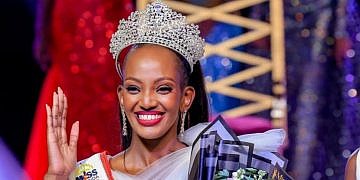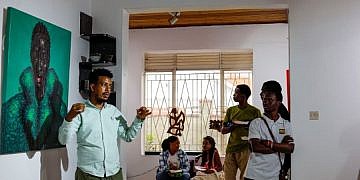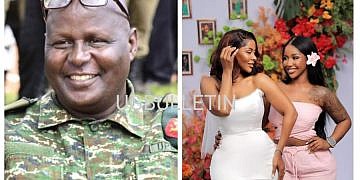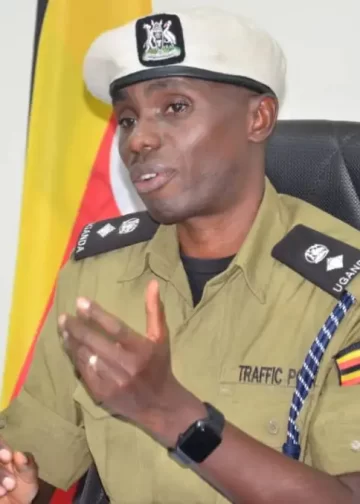Uganda is gearing up to host the Afro-Arab Youth Congress 2025, a major international event aimed at amplifying youth voices and fostering cooperation between Africa and the Arab world.
Scheduled for October 7–10 at Speke Resort Munyonyo, the gathering is expected to draw more than 1,000 delegates, including youth leaders, policymakers, innovators, and heads of state.
Speaking at the Uganda Media Centre on Wednesday, State Minister for Youth and Children Affairs, Balaam Barugahara, officially launched the event, emphasizing its role in positioning youth at the heart of peacebuilding and socio-economic transformation.
“I’m pleased to officially announce that the Afro-Arab Youth Council, in partnership with the Government of Uganda under the Office of the President, will host the Afro-Arab Youth Congress 2025. This international gathering will amplify youth voices for peace, unity, and prosperity,” Barugahara stated.
This year’s congress theme, “Amplifying Youth Voices for Peace, Unity, and Development,” aligns with the Council’s 21st anniversary and marks the launch of a $150–200 million fundraising campaign for the construction of its international headquarters in Nakawuka, Wakiso District.
“This theme was chosen to reflect the importance of youth as drivers of socio-economic transformation,” Barugahara added. “Unity cannot be achieved without bridging cultural, religious, and regional divides, and prosperity cannot be sustained unless it harnesses the vibrant energies of young people.”
The congress will include a non-elective General Assembly, the adoption of The Kampala Declaration on Afro-Arab Youth Cooperation, and various cultural exchange and innovation showcases.
Barugahara confirmed that five African and Arab heads of state have been invited, with their names to be revealed by the Office of the President. He also encouraged Ugandan youth to take advantage of the opportunity:
“I call upon the youth of Uganda to warmly welcome our visitors. Most of them are single—not married—so take the opportunity to relate with them, network, learn from them, and build connections that will enrich your ideas and innovations.”
Beyond dialogue, the congress will serve as a platform to address real-world challenges, particularly the plight of Ugandan migrant workers in the Gulf.
“Many of our graduates are working as cleaners at Dubai Airport. That is not the host country’s fault. It’s our desperation and some employment agencies misleading our youth,” he said. “We shall address these challenges through this Congress and push for reforms.”
Dr. Abbas Agaba, Secretary General of the Afro-Arab Youth Council, revealed bold plans for a futuristic Afro-Arab Youth City in Uganda—a flagship project that will include a university, cultural centre, sports stadium, international hotel, and modern office facilities.
“The international headquarters will house five projects: an office block, an international-standard hotel, a sports stadium, a cultural heritage center, and a University of Science and Technology,” he explained. “This is more than a building; it’s a dream city that will promote unity, culture exchange, and youth empowerment.”
Dr. Agaba also lauded President Yoweri Museveni for his support of the council’s vision.
“He pledged 50 acres of land and fulfilled all conditions necessary for Uganda to host this organization. He has written fundraising letters to his fellow heads of state and appointed a special envoy, Dr. Ruhakana Rugunda, to coordinate these efforts.”
Construction on the mega-project is expected to begin shortly after the congress.
Oliva Mutesi, President of the Pan African Youth Union, issued a passionate call to young people across Africa and the Arab world to unite against systemic injustice and take ownership of their future.
“We are being attacked. So it’s time we become each other’s keepers,” she said. “Africa and Arab countries are supposed to be each other’s people. Let’s use this platform to speak about our issues and protect one another.”
She warned against media narratives that paint Africa in a negative light and urged youth to shift their mindset and see their demographic advantage as a powerful asset.
“Older generations fought colonialism. Now we are fighting a mental war through manipulation and negative media narratives,” Mutesi said. “Africa is not the worst continent. I’ve traveled the world, I know we have the best food, climate, and people.”
“We always say the future is Africa. Well, that future is us—the youth. Let’s turn our numbers into a strength like China did.”
The Afro-Arab Youth Congress 2025 promises to be more than just a conference. It is a moment to redefine youth engagement, strengthen continental partnerships, and lay the foundation for a more united and empowered future across Africa and the Arab world







































